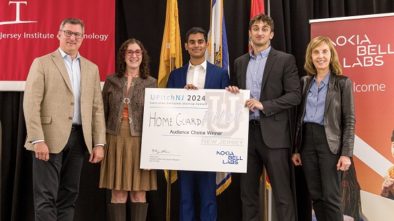Opinion: Exciting Initiatives at Princeton Could Make Central New Jersey into Long-Awaited Tech Hub
A focus on entrepreneurship, diversity at the table and ventures that will benefit humanity
Believe me. Tech hubs in New Jersey are one thing I know about. And while the energetic and enthusiastic tech community in New Jersey has been trying to create them for the longest time, their efforts haven’t exactly failed, but haven’t flowered the way we would have liked.
According to people who study these things, it takes 20 years to create a tech hub, and most of our efforts are only between seven and 10 years old, so we must give them time. So far, the most successful of these has been the work of Newark Venture Partners, which has brought many startups to Newark.
However, last week, I attended Engage 2020, a conference aimed at highlighting Princeton Innovation initiatives, and listened to the vision of three Princeton faculty members and their take on how Princeton University could be to New Jersey what Stanford is to Silicon Valley. It’s possible that their vision, along with support from the New Jersey state government, could be one way to accelerate the development of a startup hub in the Princeton area.
Over the 10 years that I have covered Princeton University, the school went from one that operated in silos and eschewed entrepreneurship to one that has embraced entrepreneurship among its students, faculty and alumni.
However, for the most part, Princeton’s successful entrepreneurs didn’t create their great companies here in New Jersey. There are exceptions, to be sure. But many Princeton’s grads left for Silicon Valley, New York, or their home states, taking their Princeton education and entrepreneurial know-how with them.
Expanding “Entrepreneurship, the Princeton Way”
Three people on the Princeton faculty have now come together to fundamentally change that. Andrea Goldsmith became the new dean of engineering and applied science at Princeton in September, Rodney Priestley was named vice dean for innovation in July, and Naveen Verma was appointed director of the Keller Center in January.
Verma pointed out that five years ago, Princeton released a report called “Entrepreneurship, the Princeton Way,” which “launched what was then a new phase of the university’s expanding committed focus on entrepreneurship and innovation.”
However, Princeton is now committing itself even more deeply to entrepreneurship. Central to this commitment, Verma said, is Princeton’s “recognizing innovation broadly as the initiation of transformations through risk-taking actions and value-creating organizations, not only by the founding of startups, but also by creating nonprofits, joining early-stage companies, and innovating within large corporations, governments and nongovernmental organizations.” These entities are “taking actions to make significant positive changes, by way of a daily process that pushes, pivots and persists.”
Princeton “has many attributes that would make it a better place to found a company than Silicon Valley.”Andrea Goldsmith
Goldsmith, the latest arrival, has the know-how and the experience to speed up Princeton’s role as an accelerant for tech companies. Her background includes engineering, academia and tech startups. She spent many years at Stanford University, and she is adamant that Princeton “has many attributes that would make it a better place to found a company than Silicon Valley.”
She noted that the cost of living is much more reasonable in New Jersey than in Silicon Valley, and that lots of land is available for companies to create campuses. Describing the cost of living in New Jersey as reasonable may make some of us laugh, but compared with California, we do have an advantage.
A Tech Hub Built for Diversity and Benefiting Humanity
A Princeton-seeded tech hub would look much different from one in Silicon Valley, she added. Technology created in Silicon Valley “cannot achieve its full potential because you don’t have diverse people sitting around the table,” she said. If Princeton is going to create an innovation ecosystem “in our own image, we can have an unfair advantage” in that “we are a very strong liberal arts university with a very strong set of values geared towards benefiting humanity.”
No one else has that kind of tech hub, she added, noting that it would draw companies and entrepreneurs with ventures that will make the world a better place.
Additionally, Princeton is seriously beefing up its engineering education program, Goldsmith said, with “grand plans to grow engineering, to grow the faculty by 50 percent, and then along with it to rapidly grow the student and postdoc population. And the reason why it’s important for Princeton engineering to grow is that this is how it’s going to maximize its impact.
“Princeton is a very, very strong engineering school today, I believe, by far the strongest of all of the Ivy League schools. And I don’t intend to have Princeton engineering compete with Stanford, or MIT or Berkeley. I intend to craft a Princeton engineering school that is elite in its own image, not competing with anybody else, because I believe that having engineering grow within a liberal arts institution will allow Princeton engineering to have a broader perspective on the technology that it develops. And on the applications of that technology.”
During his introductory remarks at Engage 2020, Priestley said, “Our mission for Princeton innovation and entrepreneurship is twofold. First, we want to encourage, facilitate, and promote innovation, entrepreneurship and partnerships that will enhance the quality and impact of research and teaching at Princeton University. Secondly, we want to enhance and support humanity through a well-integrated and nurtured innovation ecosystem that serves to improve the quality of life for all.”
New Partnerships
Priestley announced three new partnerships designed to make it easier for faculty members and grad student entrepreneurs to become successful.
- One is between Princeton and Techstars (New York), a leading startup accelerator and global innovation network. “Their network of mentors, founders, partners and investors will provide graduate students and postdoctoral scholars at Princeton with the tools and insights to push their innovations closer to commercialization,” he said. “The Techstars program will provide hands-on exploration of business strategies to develop each phase of innovation. Students will learn about customer discovery, product-market fit, strategy development, pitching to investors, presentation skills, and so much more.”
- A second partnership is between Princeton Innovation and the Wharton Business School, of the University of Pennsylvania, which will bring “additional world-class entrepreneurship training to Princeton. This new Princeton–Wharton program will provide faculty members with customized executive education that [will help] them step into advisory roles at companies formed around innovations from their laboratories.”
- The third partnership, between Princeton Innovation and InteliSpark (Ithaca, N.Y.), will help Princeton entrepreneurs secure non-dilutive funding for startups via Small Business Innovation Research grants, Small Business Technology Transfer grants and other government research funding programs. “As part of this partnership, InteliSpark will work to provide individualized training and support for faculty who are seeking to create new ventures with non-diluted government funding.”
There are many other elements in developing a successful tech hub, but Princeton seems to be working on them all. The university is collaborating with Rutgers, for example, to make its core assets available to entrepreneurs, so they’ll be able to find that key machine or expertise they need to propel their projects into products.
In conclusion, we’ll be cheering on Princeton’s initiatives in the entrepreneurship area and hope that the university will be an incubator for strong startups in New Jersey. The key here is execution, and we know that, once it has made up its mind, Princeton knows how to execute.
Also, while Princeton is doing its best to seed New Jersey with great companies, I’d like to see collaboration with all the other area entrepreneurship efforts, such as Einstein’s Alley, the Princeton Tech Meetup, Tigerlabs (Princeton), Startup Grind Princeton, Scarlet Startups (New Brunswick), TiE New Jersey (Edison), the Princeton Growth Accelerator, and TechUnited:NJ (New Brunswick), among others. I’d like the university to remember that, while they may be pushing forward in what is a new direction for them, these other organizations have been fostering the tech community, economic development and tech and life-science startups in the area for years.




